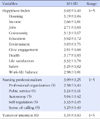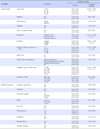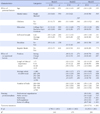This article has been retracted. See "Retraction: Factors Influencing Happiness Index of Hospital Nurses" in Volume 21 on page 587.
Abstract
Purpose
This study was conducted to provide basic data on the nursing Happiness Index and identify factors influencing nurses by describing their perception of lifestyle, health behavior, nursing professionalism, Happiness Index, and turnover intention.
Methods
On July 2012, 700 nurses from 10 general hospitals were surveyed, but 23 were omitted due to missing or incomplete data. The focus of this study was the Organization for Economic Co-operation and Development (OECD) Happiness Index, consisting of 11 OECD identified topics concerning living conditions and quality of life. Data were analyzed using χ2-tests, t-test, ANOVA, Pearson correlation coefficients and multiple regression with SPSS/WINdow 14.0.
Results
Mean score for nurses' Happiness Index was 3.03 on a scale of 5. There were significant differences on the Happiness Index for the following: age, marriage, children, education, position, work experience, wages, number of beds, medical institution, health behavior, weight, and meal patterns. There was a positive correlation between the happiness index and nursing professionalism but a negative correlation between the happiness index and turnover intention.
Figures and Tables
References
1. Arden JB. Surviving job stress: How to overcome workday pressures. 2002. New Jersey, NJ: The Career Press.
2. Aristotle . Nicomachean ethics. 1962. Indianapolis, IN: Bobbs-Merrile Company.
3. Baek HC, Kim YS. Translation and validation of Korean version of Hall's professionalism inventory. J Korean Acad Nurs Adm. 2007. 13:509–515.
4. Choi SO. The development of an organizational socialization process model for new nurses using a system dynamics approach. J Korean Acad Nurs. 2005. 35:323–335.
5. Chu HK. The Level of Happiness Index and Determining Factors. 2005. Busan, Korea: Inje University;Unpublished master's thesis.
6. Cohen J. Statistical power analysis for the behavioral sciences. 1988. 2nd ed. Hillsdale, NJ: Erlbaum.
7. George EV. Aging well. 2002. Boston, MA: Little Brown.
8. Hall RH. Professionalism and bureaucratization. Am Sociol Rev. 1968. 33(2):92–104.
9. Han YH, Sohn IS, Park KO, Kang KH. The relationships between professionalism, job involvement, organizational commitment and turnover intention among clinical nurses. J Korean Clin Nurs Res. 2010. 16(2):17–31.
10. Jang GS, Lee MH, Kim IS, Hong YM, Ha NS, Gong BH. Ethics & profession of nursing. 2009. Seoul: Hyunmunsa.
11. Jung MS, Kang YS, Ko MH, Kim DH, Kim SY, Kim EK, et al. Nursing conceptual theory. 2012. Seoul: Hyunmunsa.
12. Kang KN. Factors influencing turnover intention of nurses in small-medium sized hospitals. J Korean Acad Nurs Adm. 2012. 18:155–165.
13. Kim JH, Hyun MY, Kim YS, Kim JS, Nam SO, Song MS, et al. Psycho-social well-being, health perception and behavior among clinical nurse. J Korean Acad Nurs Adm. 2010. 16:26–36.
14. Kim MR. Influential factors on turnover intention of nurses: The affect of nurses' organizational commitment and career commitment to turnover intention. J Korean Acad Nurs Adm. 2007. 13:335–344.
15. Kim MS. A study on the relationship between job stress and health promoting behavior is among university hospital nurses. Korean J Occup Health Nurs. 2001. 10:153–163.
16. Kongkwan BK. Factors predicting to work happiness of professional nurses. 2012. Retrieved September 22, 2012. from http://www.stti.iupui.edu/pp07/convention11/Boonyarak_Kongkwan.pdf.
17. Kwon HJ, Suk BH, Chee SJ, Ahn YM, Kim YJ, Park SA, et al. The relation between the types of nursing organizational culture, nurses' satisfaction with life, and job satisfaction. J Korean Clin Nurs Res. 2011. 17(1):57–69.
18. Kwon I. The meaning of medical professionalism for the faculty members of medical school and university hospitals in Korea. J Korean Med Assoc. 2011. 54:1146–1153. http://dx.doi.org/10.5124/jkma.2011.54.11.1146.
19. Kwon MK, Kang PS, Hwang TY, Lee KS. Health behaviors of nurses at a university hospital according to type of work. Yeungnam Univ J Med. 2007. 24(1):55–67.
20. Lee NC. A study on the structure of quality of life in OECD member countries. Health Soc Welf Rev. 2012. 32(2):5–40.
21. Malee G, Arnamong T, Apinya P. Factor influencing happiness in personnel working at Boromarajonani College Nursing Bangkok Thailand. 2009. Retrieved September 22, 2012. from http://www.statssa.gov.za/isi2009/ScientificProgramme/IPMS/0602.pdf.
22. Mobley W, Horner SM, Hollingsworth A. Employee turnover: Cause, consequences and control. 1982. Massachusetts, MA: Addison-Wesley Publishing.
23. OECD Better Index. Create Your Better Life Index. 2012. Retrieved December 2, 2012. from http://www.oecdbetterlifeindex.org/#/11111111111.
24. Ratner PA, Sawatzky R. Health status, preventive behaviour and risk factors among female nurses. Health Rep. 2009. 20(3):53–61.
25. Snizek WE. Hall's professionalism scale: An empirical reassessment. Am Sociol Rev. 1972. 37:109–114.
26. Rohlf V. Promoting happiness in the workplace. AIAM Annual conference on animal management. Retrieved October 17, 2012. from http://www.aiam.com.au/resources/files/proceedings/AIAM%202012/Vanessa%20Rohlf%20Happier%20workplace.pdf.
27. Yoo SJ, Choi YH. Predictive factors influencing turnover intention of nurses in small and medium-sized hospitals in Daegu City. J Korean Acad Nurs Adm. 2009. 15:16–25.
28. Yom YH, Kwon SB, Lee YY, Kwon EK, Ko JW. The determinants of job satisfaction of nurse: Focused on work rewards. J Korean Acad Nurs Adm. 2009. 39:329–337.
29. Yoon GS, Kim SY. Influences of job stress and burnout on turnover intention of nurses. J Korean Acad Nurs Adm. 2010. 16:507–516.
30. Virginia Henderson International Nursing Library. Factors predicting the work happiness of professional nurses. 2012. Retrieved January 4, 2012. from http://hdl.handle.net/10755/202260.








